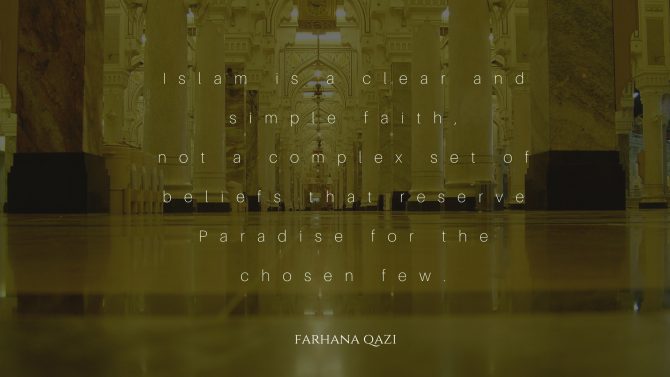It was the same dream for years: sitting with a travel magazine on an international flight when masked men take over the plane in a hijacking that seemed oh-so-1980s. The nightmare had consumed me throughout my days in the U.S. government.
In my dreams, men with dark eyes wore black masks and wielded sharp weapons. They spoke a language I vaguely understood and made plans to strike a passenger. At that moment, I rose from my seat to announce my faith: “La illaha illa la Muhammadan rasulilah.” (“There is no God but God and Muhammad is His Prophet.”) I said it three times. The masked men stopped. They looked at each other. They didn’t know what to say or do. I clutched the scarf I had pulled out of my hand- bag and recited the first lines in the Quran, “The Opening Verse.”
The men remained standing, motionless, until someone said in Gulf-accented Arabic, “Who are you?”
In the dreams, Sara was always next to me. We have been together for as long as I can remember. We went to the same college in Texas, overlooking hill country, and then I followed her to the same graduate school in Washington, DC. We both joined the Counterterrorism Center. We have so much in common: we love to travel to the Middle East, write and speak on foreign policy issues, and learn foreign languages—Sara mastered Pashto, the tongue of the Afghans—and we both love mint tea.
If I had a blond-haired sister, it would be Sara. Which is why I’m not surprised that she is always with me in the hijacking dream or when I have terrible visions of being kidnapped by masked murderers—all of whom are Muslim—and I pretend to be the Muslim heroine by saving Sara.

When the nightmares subsided, I could see beyond the fragmented conversations of masked men who came to me as apparitions. I could see that my faith was meant to be simple, rational, and practical. Islam is a clear and simple faith, not a complex set of beliefs and principles that reserve Paradise for the chosen few.
I realized that terrorists dismissed a history of compassion and mercy preached by the prophets and messengers sent by God.
In my search for the truth, I would listen to saints and study the teachings of Islam, trying to understand why extremists distorted the faith. In time, I would learn how to distinguish between legitimate and illegitimate reasons for taking up arms and the role of Muslim women in conflict. After leaving the US government and in the years to come, I would give lectures on Muslim responses to violence, telling stories with statistical proof that the majority of Muslims believe in and live by the Prophet’s earlier hadith, or oral tradition:
Those who are merciful will be shown mercy by the Most Merciful. Be merciful to those on the earth, and the One above the heavens will have mercy upon you.”
To crush extremism, I preached what I believed to be true: that a lived Islam is the answer to violent extremism and today’s increasing far-right-wing movement. Earlier messengers taught me that a practice of self-awareness, self-devotion, and a selflessness that honors God and the country I call home is founded on the principle of mercy—the attribute that enables people to replace bigotry with benevolence, prejudice with patience, and chauvinism with consent.
If there’s anything I’ve learned from my counterterrorism work, it is that extremism of any kind expunges clarity, charity, and compassion from citizenry.
Find out more in my new book, Invisible Martyrs.


